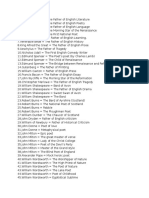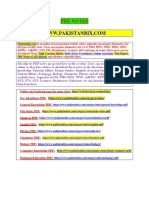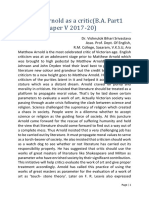0 ratings0% found this document useful (0 votes)
426 viewsNorman Conquest
Norman Conquest
Uploaded by
humerajehangirThis ppt is based on History of English Language that refers to period 1066 -1204. Linguists trace major changes in English language due to French influence.
Copyright:
© All Rights Reserved
Available Formats
Download as PPTX, PDF, TXT or read online from Scribd
Norman Conquest
Norman Conquest
Uploaded by
humerajehangir0 ratings0% found this document useful (0 votes)
426 views35 pagesThis ppt is based on History of English Language that refers to period 1066 -1204. Linguists trace major changes in English language due to French influence.
Copyright
© © All Rights Reserved
Available Formats
PPTX, PDF, TXT or read online from Scribd
Share this document
Did you find this document useful?
Is this content inappropriate?
This ppt is based on History of English Language that refers to period 1066 -1204. Linguists trace major changes in English language due to French influence.
Copyright:
© All Rights Reserved
Available Formats
Download as PPTX, PDF, TXT or read online from Scribd
Download as pptx, pdf, or txt
0 ratings0% found this document useful (0 votes)
426 views35 pagesNorman Conquest
Norman Conquest
Uploaded by
humerajehangirThis ppt is based on History of English Language that refers to period 1066 -1204. Linguists trace major changes in English language due to French influence.
Copyright:
© All Rights Reserved
Available Formats
Download as PPTX, PDF, TXT or read online from Scribd
Download as pptx, pdf, or txt
You are on page 1of 35
Norman Conquest
And the Subjection of
English
1066 ---- 1204
The Norman Conquest
Changed the Entire Course of
the English Language
The Origin of the Normans
Northern coast of France.
Northmen of the ninth and tenth
century.
Understanding between Rollo of the
Danes and Charles the Simple.
Originally of Scandinavian roots the
Northmen became absorbed in French
culture.
English and Normans became close.
1002 thelred the Unready married a
Norman wife.
1042 Edward the Confessor became king of
England.
1066
Edward the Confessor died childless.
Choice of Successor.
Godwin the Earl of West Saxon.
Edwards advisor.
Virtual ruler of England.
Harold.
Godwins son.
Day after Edwards death elected king.
Did not go unchallenged.
William, the Duke of Normandy.
From birth overcame many difficulties.
Illegitimate birth.
Father and a tanners daughter.
Became Duke of Normandy at age six.
Many assassination attempts.
Devoted care of regents kept him alive.
While in early manhood had to deal with.
Rebellious barons,
powerful neighbors,
and the French king.
Earned the name William the Great.
After calling in a number of favors and
sanctions from the Pope William landed,
unopposed, at Pevensey in September.
Battle of Hastings
Harold was off fighting another claimant
to the throne in the North.
Tostig, Harolds brother returning from
exile.(King of Norway)
Many of Harolds troops were forced to
leave due to the harvest.
Harold called on Earls in Mercia and
Northumbria, but they hung back.
Harold drew his forces on at hill at Senlac
near Hastings.
Harold had controlled the battle until a
feigned retreat by William gave the
Normans the advantage.
Harold was shot in the eye with an arrow
dying instantly.
Two of Harolds brothers were killed.
The British were leaderless.
Normans won the battle.
Normans burnt and pillaged until the
citizens of London decided not to
resist any longer.
William was named King.
Many of the English higher class had been
killed or treated as traitors.
At first William only accepted in the Southeast.
Rebellions in the southwest, west and north.
Williams embarked on many campaigns.
Often he was ruthless to make his point.
As a result English nobility was completely wiped out.
1072 only one of the twelve earls in England were
English (he was executed in 1076).
Norman influence seeped into all walks of life.
The two archbishops were Normans.
The abbots slowly changed over to Normans.
In 1075, thirteen of twenty-five Abbots were English.
In 1087, three of twenty-five Abbots were English.
Williams castles were garrisoned troops.
Richard I surrounded himself with foreign soldiers.
Creation of the Language
Use of French by the Upper Class.
Ruling class continued to use French.
200 years after the Norman conquest.
French soldiers learned English as a matter
of need.
As late as the 13th century the kings of
England were also the Dukes of Normandy.
William left Normandy to his eldest son
and England to his second son William.
Henry I reunited the two lands.
Henry II enlarged his holdings in both
areas.
Most of William and his heirs spent more
time in France than England.
Edward IV was the first king to have an
English wife (1460s).
English became the language of the lower class.
While resentment existed, relations seemed
calm.
At age 43 William the Conqueror attempted to
learn English.
Better rule and understand the people and
courts.
Most literature produced was French.
Upper-class spoke French.
Literature is a leisure activity.
Over time the language barrier
became blurred.
English would desire to speak
French.
Normans had to speak English out
of necessity.
Written English survived in
monasteries.
Middle class were required to be
fluent in both English and French.
Results of the Norman
Conquest
Political
Breaking up / replacing Earldoms
Replacing religious powers
Kings Court Central Figure
previous British Earls more or less
independent states
Strict feudal system
Organization
Records
Economic, Political, Religious
Closer to the continent
Commercial
Trade
Resources
Political
France
Allies
Religious
Roman Catholic Church
Norman Catholic Church
Introduction to cultural influence of the
continent
Normans
Intellectual; readiness / mobile spirit
self control / vigorous aggression
Zest for refined life
light hearted song
fancy clothes
beautiful manuscripts
graceful architecture
Chivalry
linked to feudal obligations
reverence of the Virgin Mary
Closer Relations with people,
government, and church
Rome / France / Papacy
Superior Architecture
Replaced Romanesque with Gothic
Founding of Oxford and Cambridge
Broaden intellectual horizons
Literary and cultural centers of the
country
Derived from French / Latin / Latin
folklore
Essential features
Seven
1) Lack of verisimilitude (reality)
Exaggeration of Human voice
Idealization of virtues
Ideality of adventures
Passion for
Strong
Marvelous
Impossible
Improbable
2) Emphasis of supreme devotion to the
fair lady
Sentimental woman worship
Courtly love
3) Past scenes of manners / morals /
chivalry
4) Presences of a quest
5) Religions / supernatural appearances
6) Characters are typical / not individual
7) Lack of consecutiveness
The Normans Influence on English
Language
1066 1204: English in decline
In 1066 the Normans invaded England,
and the French of Normandy, together
with Latin, was to become the
language of court,
English was still used by the majority of
common people, but it had no prestige
and there was no literature written in
English for 200 years.
few written records of early Middle
English, especially between1100 and
1200
Situation of the ruling class speaking one
language, and their subordinates another,
could not last. Normans had to learn some
English in order to communicate. Norman
kings set off to the Crusades in the 12 th
century- they had to persuade people to go
there; would have used English for
propaganda- just like Alfred.
the use of French by the upper class; nobility,
aristocrats and finally its influence on the
Middle class;
the extensive use of French literature in court
and the
Royal family's role in the promotion of French
poetry
Words which are mostly related to
Law, government, politics.
Antiquate, and royal court.
accuse ,arrest
Parliament, treasure
soldier, lieutenant
ambulance , ballet, biscuit,
camouflage, chauffeur, coup
d'etat,, coupon, crayon, debris,
dentist, detour, diplomat, route,
entrepreneur,, envoy, espionage,
memoir, menu, regime, salvage,
souffl, souvenir, splendid,
wardrobe
attach attach
au contraire
au naturel
avant-garde
Innovative,
blond"fair-haired
bon apptit"good appetite
bon voyage"good trip"
caf au lait"coffee with milk"
cerise"cherry"
c'est la vie"that's life"
chaise longue"long chair"
charg d'affaires"charged with business
charg la'afemme
Absence of Standard Dialect(11661400A.D)
Due to fall of Anglo-Saxon Kingdom ,the
language scene of England became
uncertain.
Thre languags in London:
The Southern dialect West Saxon
Northern EnglishNorthumbrian
Mercian Midland dialect (side by side
of Anglo-French
Latin continued impact(language of
intellectually snobbish to learn language
and literature)
Changes in the Old English
Middle English is not a language of
separate identity
Form of Old English
Largely and initially due to the impact
of Norman-French language on AngloSaxon
Two of the English alphabets K and Q
were introduced around 1240 by
Norman French masters
Latterly, Parisian French language
started to influence Anglo-Saxon
You might also like
- History of English ProseDocument50 pagesHistory of English ProseAhmed Siddique0% (1)
- Liv. ContradictionsDocument2 pagesLiv. ContradictionsMohammad HayatiNo ratings yet
- John DrydenDocument4 pagesJohn DrydenKanwal KhalidNo ratings yet
- English Tintern AbbeyDocument29 pagesEnglish Tintern AbbeyJagruti Nirav100% (1)
- Restoration Drama and ProseDocument2 pagesRestoration Drama and Prosescarlett811100% (1)
- The Origin and Development of English Novel: A Descriptive Literature ReviewDocument6 pagesThe Origin and Development of English Novel: A Descriptive Literature ReviewIJELS Research JournalNo ratings yet
- Solved Question PaperDocument20 pagesSolved Question PaperMohan KalawateNo ratings yet
- Cavalier Poet - WikipediaDocument4 pagesCavalier Poet - Wikipediasa46851No ratings yet
- S. T. Coleridge As A Critic: Sunday, November 23, 2008 Last IslandDocument5 pagesS. T. Coleridge As A Critic: Sunday, November 23, 2008 Last IslandSamir NuriNo ratings yet
- English NotesDocument2 pagesEnglish NotesDesh Bandhu KaitNo ratings yet
- Features of The Modern Age and The Modern PoetryDocument12 pagesFeatures of The Modern Age and The Modern PoetryAnusha KhalidNo ratings yet
- Classical DramaDocument60 pagesClassical DramaplaystoreiftiNo ratings yet
- 4 - The Rise of The Middle Class - The Barren AgeDocument2 pages4 - The Rise of The Middle Class - The Barren AgeOry BelliuNo ratings yet
- Metaphisical AgeDocument6 pagesMetaphisical AgeDavid KhanNo ratings yet
- Classics in DramaDocument44 pagesClassics in DramaKamran business accountNo ratings yet
- Panini and Modern+ Linguistics PDFDocument16 pagesPanini and Modern+ Linguistics PDFSudip HaldarNo ratings yet
- 11.1 The RomanticismDocument5 pages11.1 The RomanticismHaron Waweru (Engineer Waweru)No ratings yet
- Neoclassical PeriodDocument7 pagesNeoclassical PeriodAngelica ArroyoNo ratings yet
- Post-Colonial Feminist Approach in A Passage To IndiaDocument5 pagesPost-Colonial Feminist Approach in A Passage To IndiaWaseem AliNo ratings yet
- The Cambridge Companion To Rabindranath Tagore (Cambridge Companions To Literature) (Sukanta Chaudhuri (Editor) )Document408 pagesThe Cambridge Companion To Rabindranath Tagore (Cambridge Companions To Literature) (Sukanta Chaudhuri (Editor) )Willer SiqueiraNo ratings yet
- Mourning Becomes ElectraDocument3 pagesMourning Becomes ElectraJauhar JauharabadNo ratings yet
- Classical DramaDocument140 pagesClassical DramaMaqsood AhmadNo ratings yet
- Influence of University Wits On English Literature - BDTIPS PDFDocument5 pagesInfluence of University Wits On English Literature - BDTIPS PDFPeeyush KumarNo ratings yet
- THE AGE OF CHAUCER (1350-1400) and His Contemporaries By: Shireen Bilgrami Background of The 14 CenturyDocument3 pagesTHE AGE OF CHAUCER (1350-1400) and His Contemporaries By: Shireen Bilgrami Background of The 14 Centurybushra mumtazNo ratings yet
- English LiteratureDocument8 pagesEnglish LiteraturekryptoniterayNo ratings yet
- An Essay On CriticismDocument2 pagesAn Essay On CriticismSherren Nala50% (2)
- Neo ClassicismDocument14 pagesNeo Classicismnirmal mohantyNo ratings yet
- Preface To Lyyrical BalladsDocument3 pagesPreface To Lyyrical Ballads雲ChaZzyNo ratings yet
- Renaissance Short QsDocument4 pagesRenaissance Short QsMd Masud RanaNo ratings yet
- Forms of DramaDocument2 pagesForms of Dramaarshad tararNo ratings yet
- History of English Literature PDF NotesDocument33 pagesHistory of English Literature PDF NotesNouman GhaniNo ratings yet
- The Renaissance Period in English LiteratureDocument4 pagesThe Renaissance Period in English LiteratureKapil BhattNo ratings yet
- Mcqs of LiteratureDocument109 pagesMcqs of LiteratureFathima ShiyasNo ratings yet
- 07 Chapter 2Document62 pages07 Chapter 2Muhammad Asim Hafeez ThindNo ratings yet
- English Literature Project On Shakespeare's Literary Background and Achievements During Elizabethan AgeDocument6 pagesEnglish Literature Project On Shakespeare's Literary Background and Achievements During Elizabethan AgeSanjampreet Singh100% (1)
- Romantic AgeDocument8 pagesRomantic Agemuhammedrajeeb17No ratings yet
- Passage To IndiaDocument12 pagesPassage To IndiaArnavBhattacharyaNo ratings yet
- Chaucer As The ChroniclerDocument3 pagesChaucer As The ChroniclerSaleem Raza100% (1)
- American Literature NotesDocument24 pagesAmerican Literature NotesGS NereaNo ratings yet
- The 18th Century ProseDocument13 pagesThe 18th Century ProseMuqaddas AkramNo ratings yet
- Rest U14 CollinsDocument2 pagesRest U14 CollinsAli RaZza Khan100% (1)
- Sir Philip Sidney Enotes Summary of Sidney's Defence or Apology For PoetryDocument4 pagesSir Philip Sidney Enotes Summary of Sidney's Defence or Apology For Poetrycjlass100% (2)
- Chaucer As A Father of English PoetryDocument2 pagesChaucer As A Father of English Poetryrabiul hasan0% (1)
- Important Questions M.A New-1Document3 pagesImportant Questions M.A New-1Uzma KanwalNo ratings yet
- Define Literature. How Does It Work in Society?: IntroductionDocument10 pagesDefine Literature. How Does It Work in Society?: IntroductionAbdul KareemNo ratings yet
- American Literature-Richard Wilbur & Adrienne Rich 2015Document31 pagesAmerican Literature-Richard Wilbur & Adrienne Rich 2015ZaraKhan100% (1)
- THE PURITAN AGE (1620 - 1660) : Milton (1600-1660), Which Is FurtherDocument20 pagesTHE PURITAN AGE (1620 - 1660) : Milton (1600-1660), Which Is FurthermehrNo ratings yet
- Pamela or Virtue RewardedDocument80 pagesPamela or Virtue RewardedawtshfhdNo ratings yet
- Anglo Saxon PeriodDocument10 pagesAnglo Saxon PeriodPicturing PakistanNo ratings yet
- The University Wits - Easy EnglishDocument3 pagesThe University Wits - Easy EnglishNayan BhuiNo ratings yet
- The Mummy AwakensDocument1 pageThe Mummy Awakensroshanprinceprince85100% (1)
- Joseph AndrewsDocument18 pagesJoseph AndrewsZia Ullah100% (1)
- Joseph Andrews - Summary and Analysis - Author's Preface - CliffsNotesDocument2 pagesJoseph Andrews - Summary and Analysis - Author's Preface - CliffsNoteskhushnood ali100% (2)
- Geoffrey Chaucer: The Era of ChaucerDocument4 pagesGeoffrey Chaucer: The Era of ChaucerAmy AhmedNo ratings yet
- Novel 1Document35 pagesNovel 1kumarisrishti224No ratings yet
- 3 - Wordsworth - The Preface and DaffodilsDocument8 pages3 - Wordsworth - The Preface and DaffodilsSarha Fiorenza100% (1)
- Matthew Arnold As A CriticDocument2 pagesMatthew Arnold As A CriticAnkur AryaNo ratings yet
- Fancy and ImaginationDocument16 pagesFancy and ImaginationHimanshu GoelNo ratings yet
- Questions On Joseph AndrewsDocument6 pagesQuestions On Joseph AndrewsAdeel RazaNo ratings yet
- HEL - Lecture 2 On The Indo European Family of LanguagesDocument35 pagesHEL - Lecture 2 On The Indo European Family of Languageshumerajehangir100% (2)
- Grimm's LawDocument18 pagesGrimm's Lawhumerajehangir100% (3)
- GL - Lecture 2 The Development of WritingDocument24 pagesGL - Lecture 2 The Development of Writinghumerajehangir67% (3)
- SInclair Corpus Concordance CollocationDocument20 pagesSInclair Corpus Concordance Collocationhumerajehangir71% (7)
- English Literature Assignment: Topic: Character Sketch of ShylockDocument7 pagesEnglish Literature Assignment: Topic: Character Sketch of ShylockEmilda SaraNo ratings yet
- The Sources of Davenant's The Siege of RhodesDocument7 pagesThe Sources of Davenant's The Siege of RhodesGodwin GaakuNo ratings yet
- English Day Circular 2023Document31 pagesEnglish Day Circular 2023thisanga195100% (2)
- Cinderella - WikipediaDocument20 pagesCinderella - WikipediaAnonymous SDUIPeqXNo ratings yet
- Poetry Class Finished - For NowDocument123 pagesPoetry Class Finished - For NowMax Heinegg100% (1)
- Sonnet 130 by William Shakespeare Is A Satirical Take On The Conventional Love Sonnets of His TimeDocument3 pagesSonnet 130 by William Shakespeare Is A Satirical Take On The Conventional Love Sonnets of His Timemishomabunda20No ratings yet
- LordOng NewCatholicEncycloDocument11 pagesLordOng NewCatholicEncycloGustavo Milano BeserraNo ratings yet
- Name: Pronunciation: Name: Pronunciation:: Here Are Some Notes of The Lessons That We Discussed From Week 1Document21 pagesName: Pronunciation: Name: Pronunciation:: Here Are Some Notes of The Lessons That We Discussed From Week 1Alessandra Sophia Lopez CabigasNo ratings yet
- Gujarati Books in VSPC LibraryDocument480 pagesGujarati Books in VSPC Librarytapanjbhatt98910% (1)
- CRW11 - 12 Q2 0403M - PS - Intertextuality in DramaDocument51 pagesCRW11 - 12 Q2 0403M - PS - Intertextuality in DramaArleneRamos100% (1)
- Creative Writing CG For The SubjectDocument10 pagesCreative Writing CG For The Subjectjonilopie1126No ratings yet
- The Passionate Shepherd To His LoveDocument3 pagesThe Passionate Shepherd To His LoveKristell C. LagardeNo ratings yet
- Heda JasonDocument3 pagesHeda JasonSonjaStojanovićNo ratings yet
- My Mother at Sixty Six-1Document4 pagesMy Mother at Sixty Six-1rajhavishal30No ratings yet
- Dheepa SundaramDocument290 pagesDheepa SundaramMaldivo Giuseppe Vai100% (2)
- Philippine Contemporary WritersDocument3 pagesPhilippine Contemporary WritersPaul john NazarenoNo ratings yet
- 110 Core Lab Film Wit HandoutDocument3 pages110 Core Lab Film Wit HandoutTrey ErnyNo ratings yet
- Comma Use Rules and PracticeDocument4 pagesComma Use Rules and PracticeVanessa CifuentesNo ratings yet
- 1919 - Wine and Spirits - The Connoisseur's Textbook by Simon, André LouisDocument300 pages1919 - Wine and Spirits - The Connoisseur's Textbook by Simon, André LouisLucio TucciNo ratings yet
- Arthur Conan DoyleDocument9 pagesArthur Conan DoyleMohammad AzimNo ratings yet
- Poetry Part3Document16 pagesPoetry Part3Allen MarcNo ratings yet
- Indian Languane PressDocument5 pagesIndian Languane PressDeepu JoseNo ratings yet
- Mellows of Divine Love Raganuga BhaktiDocument210 pagesMellows of Divine Love Raganuga BhaktiAtula Krsna100% (1)
- Wonders Lesson Plan PoemsDocument9 pagesWonders Lesson Plan Poemsapi-318395482No ratings yet
- Devotional MantrasDocument17 pagesDevotional MantrasChetanya93No ratings yet
- Sinners in The Hands of An Angry God Analysis QuestionsDocument2 pagesSinners in The Hands of An Angry God Analysis Questionsapi-266152386100% (1)
- To The Virgins, To Make Much of Time: Robert HerrickDocument4 pagesTo The Virgins, To Make Much of Time: Robert Herrickklean_007No ratings yet
- Rip Van WinkleDocument9 pagesRip Van WinkleMichael KaranikolasNo ratings yet
- Chairoerson/ Fhhe CommitteeDocument318 pagesChairoerson/ Fhhe CommitteeAnalyn AmorosoNo ratings yet





























































































